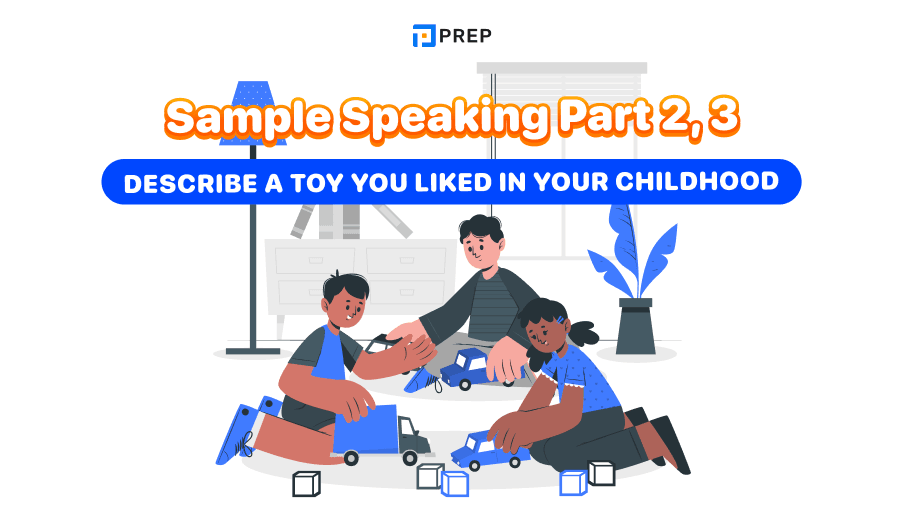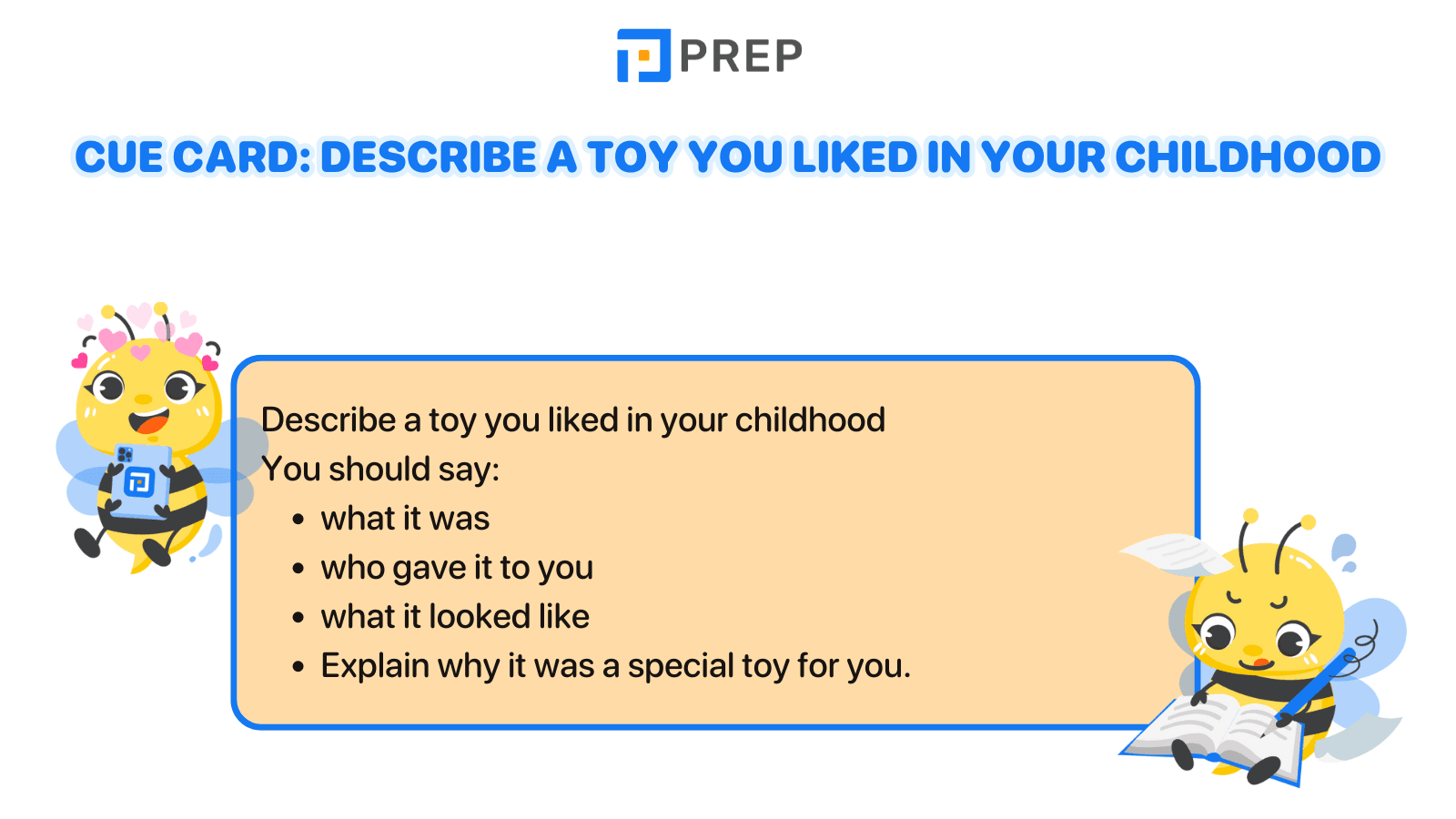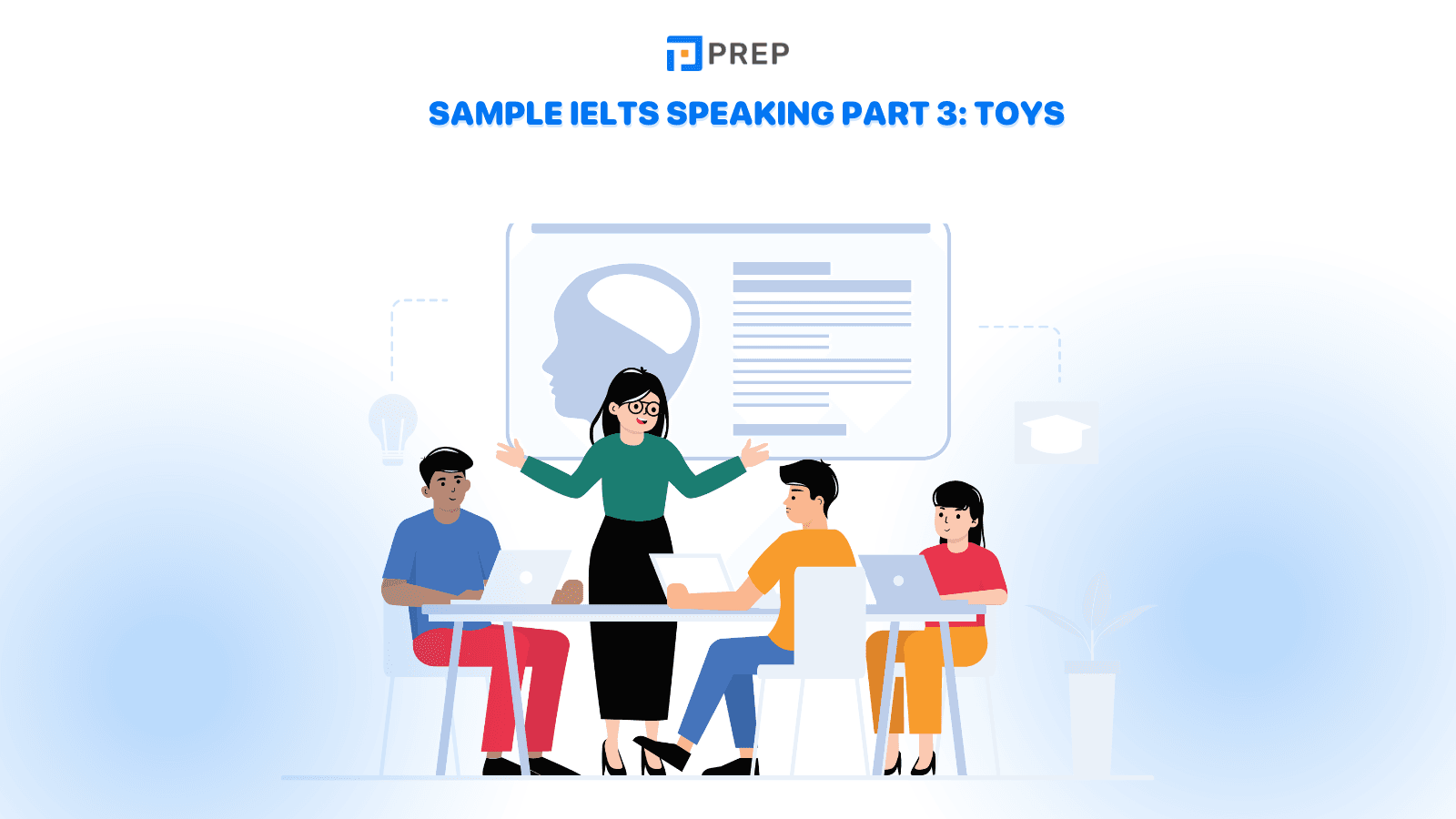Sample Speaking Part 2, 3: Describe a toy you liked in your childhood
Describing a toy you liked in your childhood is a very familiar topic for IELTS Speaking candidates practicing at home. It may seem easy, as surely each of us has had a favorite toy from our childhood, right? However, how to meet the 4 assessment criteria and achieve a high band score is extremely difficult, and not everyone can easily conquer this task.
Therefore, below is an outline, sample response, and useful vocabulary that have been used in the IELTS Speaking Part 2 + 3 topic "Describe a toy you liked in your childhood", written by teachers at PREP. Please take a look! Additionally, this sample can also be applied to the topics: "Describe a special toy you had in your childhood" or "Describe your favorite toy as a child!"

I. Sample IELTS Speaking Part 2: Describe a toy you liked in your childhood

1. Cue card
Describe a toy you liked in your childhood. You should say:
-
what it was
-
who gave it to you
-
what it looked like
-
and explain why it was a special toy for you.

2. Outline: Part 2
2.1. Idea
-
For the topic "Describe a toy you liked in your childhood", first we need to decide which tense to use. Here, we should use past tenses as the question mainly asks about past events.
-
Next, we will need to answer each part of the "Describe a toy you liked in your childhood" task. First, we must clearly state what the toy was, then describe the toy - including the color and shape.
-
For the second question in the "Describe a toy you liked in your childhood" task, we should clarify who gave us the toy and may add 1-2 sentences about the special occasion.
-
Finally, explain why this toy was special. Try to link this part to the storytelling above to create coherence in the "Describe a toy you liked in your childhood" response. Additionally, we can mention how we used to play with this toy or with whom.
-
And to make the conclusion of the "Describe a toy you liked in your childhood" task even more special, you can talk about your own intention, whether you kept or gave away the toy. Here, we should explain the reasoning behind our decision.
2.2. One-minute note taking
In IELTS Speaking Part 2, candidates are given a task card with a topic and are required to speak for 1-2 minutes. To prepare for this, you are typically given 1 minute to make some notes before you start speaking.
This one-minute note-taking period is an important part of the task. It allows you to quickly organize your thoughts, brainstorm key points, and structure your response before you start speaking. Effective note-taking can help you:
|
Kitchen toys: kettle, 2 plates, 4 cups (family), forks, knives, spoons, pan |
|
Parents gave this kitchen set on my birthday |
|
Attracted by - hot pink colour |
|
Why?
|
3. Sample Speaking: Describe a toy you liked in your childhood
Below is a sample IELTS Speaking Part 2 response on the topic "Describe a toy you liked in your childhood". Take a look to effectively practice IELTS Speaking at home, Preppies!
Let's listen to the IELTS Speaking Part 2 sample response - "Describe a toy you liked in your childhood":
Everyone has a childhood toy that they are emotionally attached to, well, I am not an exception. To give you the context, when I was 7, I was in love with a set of kitchen toys. It was a pack of kitchen tools like a kettle, a pan, several plates, and cups; oh, forks and a knife also went with the package. Although I liked it, I didn’t ask my parents for it because I knew our financial condition was not stable. We had to tighten our belts so as not to slump at the end of the month.
Surprisingly, on my birthday, my parents gave me the toy package. I was certainly floating on air at that moment, knowing that I had owned my desired plaything and realizing they had dug deep into their pockets just to meet my wants.
About the plastic kitchen set, it was in hot pink. Well, hot colors have always attracted me in an instant, so it shouldn't be strange when my full attention was caught.
After having the kitchen kit, I started to invite friends for my imaginary tea party or dinner. I even make fake pearls and legos as my cooking ingredients to make the food.
Come to think of it, it was my favorite toy as I usually took it out to play the most mainly because I could call the neighbor kids to come over. I still keep the set until this day, but then I gave it to my niece when she reached 4 since I also want her to sense the joy that I had years ago.
Having a strong vocabulary is crucial for success in IELTS Speaking Part 2. This section requires you to speak at length about a given topic, so having a diverse range of words at your disposal is essential. The examiner will be assessing your lexical resource - your ability to use a wide vocabulary, including less common and idiomatic terms. Focusing on expanding your vocabulary, especially topic-specific words and collocations, will allow you to describe things in more detail, use more precise language, and demonstrate your command of the English language. Ultimately, a rich vocabulary can help you achieve a higher band score in this challenging part of the IELTS Speaking test.
Below is the vocabulary employed in the sample of the topic Describe a toy you liked in your childhood:
-
Emotionally attached to sth: Emotionally attached to something
-
Tighten one's belt: Tighten one's belt
-
Slump (v): Slump (verb) - to experience an economic crisis or downturn
-
Float on air: To be extremely happy or joyful
-
Dig deep into one's pocket: To spend a lot of money
-
In an instant (n): Immediately, right away
-
Come to think of it: Now that I think about it
For more information, please refer to the following articles:
50+ bài mẫu IELTS Speaking Part 2 phù hợp với band điểm 6.5+!
II. Sample IELTS Speaking Part 3: Toys

Let's listen to the IELTS Speaking Part 3 sample response - Toys:
1. What toys are popular with boys and girls in your country now?
I think there are two outstanding names that I could immediately think of. For one thing, slimes have been very popular among all the kids. It is a glue-like substance in vibrant colors. The reason why it is so common is that you can either buy at a store or can make it by yourself by mixing borax and warm water. Another toy is the two-dimensional octopus. One side shows happiness and the other expresses fury, of course in an adorable way. I can see that some of the youngsters post stories on social networking sites to tell their emotions.
-
Glue-like (adj): Having a sticky, adhesive-like quality
-
Substance (noun): A material with a particular composition
-
Vibrant (adj): Bright, vivid, and bold in color
-
Borax (n): A mineral compound used as a cleaning agent
-
Fury (n): Intense, uncontrolled anger
2. Do you think advertising that targets children should be banned?
My assumption could be wrong, but commercials targeting at children should be prohibited on all forms of media since it might be the premise of child labor abuse. In several advertisement, small kids will be hired to act in front of a camera trying a new candy or toy. Consequently, some parents will take advantage of this and monetize their child when they have full control of the kids’ schedule and legal rights. To prevent this alarming tendency, the government should step in and enforce laws on this kind of advertising.
-
Premise (noun): A basis or starting point for a line of argument or reasoning
-
Child labour abuse (noun phrase): The exploitation and mistreatment of child workers
-
Monetize (verb): To convert or transform something into money or a monetary value
-
Enforce (verb): To compel observance of or compliance with a law, rule, or obligation
3. Do you see the fact that children are targeted by many companies as potential consumers spoil their childhood
I completely disagree with this opinion. It is parents' duty to control what they give their children. Even if companies try to sell off their products to kids, the adults are people who make the last decision whether they should buy the toy. Therefore, we can't conclude that companies' marketing strategies will ruin a childhood. Moreover, a toy is a fraction of the early years of a child.
There are other elements making a childhood, like quality time with family and friends or interaction with nature. Once again, I strongly oppose the idea that toy makers are negatively affecting small children.
-
Strategy (n): A plan of action designed to achieve a long-term or overall aim
-
A fraction of sth: A small part or portion of something
-
Quality time: Time spent in a meaningful or purposeful way
-
Oppose (v): To express strong disagreement with or be against something
III. Conclusion
This article has provided the most detailed sample IELTS Speaking Part 1 + 2 response on the topic "Describe a toy you liked in your childhood". So what are you waiting for, save this sample response and practice IELTS Speaking effectively, Preppies!

Hi I'm Chloe, and I am currently serving as an Product Content Administrator at Prep Education. With over five years of experience in independent online IELTS study and exam preparation, I am confident in my ability to support learners in achieving their highest possible scores.
Comment
Premium content
View allPersonalized roadmap
Most read












